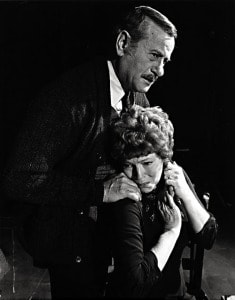 I believe Eli Wallach was 82 when we began rehearsals for Jeff Baron’s Visiting Mr. Green. I hadn’t been directing long, and I was in awe of Eli. We had a cot there, in case he wanted to lie down during breaks. (He hardly ever did.) I’d call a ten, walk away to have a coffee, and when I returned, there was Eli, in the same chair working with a prop—dissecting it, turning it around in his hands. Did it work better to pick it up this way, or that? It never ended. Every aspect of putting together a performance fascinated him, engaged him—he loved it all. Breaks were for other people; what could be more interesting than working on a performance? What in life could be more important? Eli respected everything about the theatre, loved every aspect of it—the joy and the pain. He was, in fact, a high priest of the theatre, and he preached its glory everyday throughout the land for the better part of his life.
I believe Eli Wallach was 82 when we began rehearsals for Jeff Baron’s Visiting Mr. Green. I hadn’t been directing long, and I was in awe of Eli. We had a cot there, in case he wanted to lie down during breaks. (He hardly ever did.) I’d call a ten, walk away to have a coffee, and when I returned, there was Eli, in the same chair working with a prop—dissecting it, turning it around in his hands. Did it work better to pick it up this way, or that? It never ended. Every aspect of putting together a performance fascinated him, engaged him—he loved it all. Breaks were for other people; what could be more interesting than working on a performance? What in life could be more important? Eli respected everything about the theatre, loved every aspect of it—the joy and the pain. He was, in fact, a high priest of the theatre, and he preached its glory everyday throughout the land for the better part of his life.
We remained friends for the rest of his life, and occasionally, I would pick him up at his Riverside Drive apartment, and we’d walk to Broadway to get “some soup.” Over soup, he would tell me the story of how he turned down a role in From Here to Eternity so he could play Kilroy in Tennessee Williams’s Camino Real. Frank Sinatra wound up playing the role, and ultimately won an Oscar for his performance. Eli told me every time he ran into him, Sinatra would yell, “I know you, you’re that crazy actor!” Giving up a part in a movie for a play? Unthinkable! The stage was Eli’s life. Did he regret it? Not for a second.
He’d tell me how Marilyn Monroe would come over and play with his children, or how he was worried about Elia Kazan seeming lonely or depressed. And then there were the stories about Marlon. There was something about how Eli said the name Marlon that was somehow thrilling. Eli was at the center of a Golden Age of Broadway—and I hung on every word of the stories he loved to tell about his pals, who were heroes to me.
There are two things Eli told me that I will remember always. At a 60th-anniversary party for him and Anne Jackson, I asked, “Eli, how did you do it? Sixty years?” He replied, deadpan, “The first 30 were the toughest.” And then a few years later, after a spell of complaining about not working enough, at the age of 90, Eli fired his agent, who he had been with for decades. Why? He wasn’t getting enough auditions. At 90! And, you know what? He was right—the new agent sent him out more, and business picked up for him!
Watching Eli work, I would often think, “I wish I had something in my life that I loved to do as much as Eli loved to act.” It was as important to him as the air he breathed, and yet he seemed to have found the time to raise three children—Peter, Roberta and Katherine—who adored him, delighted in him and celebrated him every moment. As for Anne, who in her later years didn’t work as much as Eli, he was always concerned about her. It was hard for him to work as much as he did when he knew how much she wanted to work, too. It didn’t stop him, but it didn’t go by unnoticed how tough it was for her.
Both Eli and Anne were wonderful supporters. They came to any opening you invited them to, and the party—and they posed for pictures. When a little documentary was being made about me, Eli readily agreed to an interview. He told the interviewer I was one of his favorite directors, and that I taught him how to act “old.” Whether it was true or he just said it to be nice, it gave me tremendous confidence. Seventeen years later, it still does.
If there is a heaven, Eli and Kazan are probably in rehearsal with a new Williams play, with—I’m imagining—Geraldine Page, Maureen Stapleton and Marlon. “Gadg” is probably calling a ten, and though everyone is breaking for a celestial cup of coffee, Eli is staying put on some cloud, working with a prop, and loving every second of it.
Lonny Price is an actor, a writer and director living in New York City.

